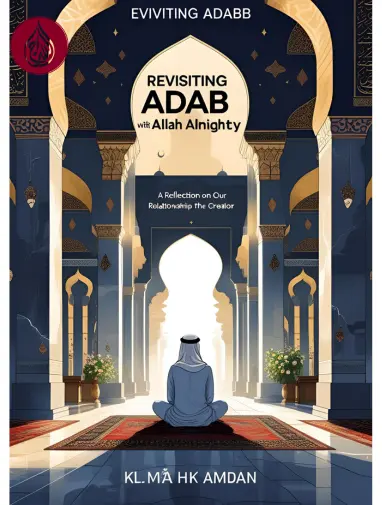We often talk about adab with Allah in the context of our interactions with others—fellow believers, family, friends, scholars, saints, and especially the Prophet Muhammad ﷺ. This article, however, explores the concept of adab in relation to Allah Almighty, the Lord of the Worlds.
Introduction
Adab is commonly translated as good manners, referring to a sense of propriety, civility, and the manner in which one conducts oneself. A person with adab is characterized by their courtesy and ability to behave in accordance with the norms and expectations of a given situation. Such individuals avoid actions or behavior that would be considered inappropriate or unbecoming. Adab means living with integrity, aligning actions with refined excellence and truth.
The Origins of Adab
Given the diversity of human relationships and the variety of circumstances we face, each individual is tasked with upholding different forms of adab at various times. A person may be a child, a parent, a sibling, a friend, an employee, or an employer. In each of these roles, a particular form of conduct is expected—adab appropriate to the relationship.
The way we express adab differs depending on a variety of factors such as the closeness of the relationship, age, religious standing, and context. For example, the way we behave with a close friend is different from how we should act with a teacher. Similarly, our conduct with our parents differs from how we would interact with a passing stranger.
Our responsibilities and the etiquettes we observe in these relationships vary, with some requiring more effort and priority than others. Regardless of the differences, adab remains important. As the Messenger of Allah ﷺ said: “Indeed, Allah ﷻ has prescribed excellence in everything.”
Our Relationship with Allah Almighty
Among all the relationships a human being holds, the most foundational and significant is the relationship with Allah ﷻ. This bond supersedes all others for several reasons:
- It is the basis for all other relationships: Without the creation of Allah ﷻ, no other relationship would exist. Thus, the connection with Allah precedes and forms the foundation for every other tie we may have.
- It is the only relationship that is not dependent on choice: While one might not have children, a spouse, or friends, being a servant of Allah ﷻ is inescapable and absolute. We are entirely dependent on Allah, and this bond is unchangeable.
- Our conduct with others stems from this bond: Our understanding of what is right or wrong, what constitutes good manners and conduct, is based on the moral guidance from Allah ﷻ. As we learn from Allah’s teachings, the manner in which we interact with others is shaped by this foundational relationship.
It’s essential to recognize that adab with Allah ﷻ is not something separate from adab with others or the world around us. In fact, proper adab with Allah involves upholding good manners with His creation. True adab with Allah is reflected in how we treat others.
How Should We Demonstrate Adab with Allah ﷻ?
Having understood the importance of adab in various relationships, particularly our relationship with Allah ﷻ, it is essential to understand what adab with Allah entails. Here are some core principles:
Absolute Monotheism (Tawhid):
The first and most fundamental aspect of adab with Allah is to affirm His singularity. We must worship only Allah and avoid associating any partners with Him, as Allah Almighty says: “Worship Allah and do not associate anything with Him.” (4:36). To ascribe divinity to anyone or anything other than Allah is the greatest injustice.
Sincerity in Worship:
Our worship must be directed solely towards Allah ﷻ, with the pure intention of seeking His pleasure. As Allah ﷻ says: “Whoever fears to meet his Lord should do good deeds and not associate anyone in the worship of His Lord.” (18:110). Our worship should not be for anyone or anything other than Allah.
Furthermore, Allah has made it clear that actions are only accepted when done with sincerity to Him alone. The Messenger of Allah ﷺ narrated that Allah ﷻ said: “I am the One who is in need of no partners. If anyone does an action in which he associates anyone else with Me, I shall leave him with the one whom he associated with Me.”
Wholehearted Submission to His Revelation:
Adab with Allah requires submitting to His commands and revelations fully. This means hearing, obeying, and accepting all that has been revealed in the Qur’an and transmitted through the Prophet ﷺ. It involves following His commands, avoiding His prohibitions, and having firm belief in the unseen (al-ghayb).
Contentment with His Decree:
A well-mannered servant of Allah ﷻ accepts and submits to His will, knowing that everything is under His control. As Allah ﷻ says: “He is not questioned as to what He does, but they will be asked.” (21:23). Adab with Allah means accepting His divine decree with patience, whether it concerns trials, wealth distribution, or any other matter.
Expressing Joy and Gratitude:
Being grateful for all the blessings Allah has granted us is an essential part of adab. This includes not only the blessings of life, health, and provision, but also the greatest blessing of guidance and faith. The Messenger of Allah ﷺ, despite his unparalleled status, would pray to the point that his blessed feet swelled, saying: “Should I not be a thankful slave?”
It is considered poor manners not to express gratitude to the one who does you good. Allah ﷻ promises: “If you are grateful, I will surely increase you.” (14:7). Gratitude is a powerful means to attract more blessings.
Conclusion
The relationship we have with Allah Almighty is continuous and ever-present. The first step toward good adab is acknowledging that we are His servants. Just as we strive to improve our human relationships—whether with our family, friends, or colleagues—we must also seek to strengthen our relationship with our Creator. Each relationship has its own appropriate conduct, and in our connection with Allah ﷻ, this adab extends across our physical, mental, and spiritual states. In this article, we have touched on a few key ways to cultivate good manners in our servitude to Allah ﷻ. Though it is not possible to fully encapsulate the concept of adab in one brief article, its foundation lies in being conscious of Allah, understanding our status as His creations, and conducting ourselves in a manner that reflects this reality in every aspect of our lives.
This article is supported by As-Siraj Charity Organization, which aims to further the cause of education and welfare in communities.
References:
- Muslim 1955
- Muslim 2985
- Bukhari 6471
- al-Attas. Islam and Secularism, pg. 105
Through our collaboration with The House of Wisdom, we aim to inspire thoughtful discourse and promote access to quality knowledge.






